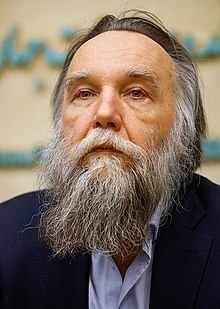https://en.wikipedia.org/wiki/Aleksandr_Dugin

Alexander Dugin (Александр Дугин) is a Russian Neo-Fascist philosopher and the leader of Eurasia Movement and its components, the Eurasia Party, its youth wing the Eurasian Youth Union, and the International Eurasian Movement and the Tsargrad Institute (represented online by the Katehon think tank), Dugin was also a former leader of the National Bolshevik Party.
Dugin promotes an ideology known as “National Bolshevism” or “NazBol” for short (also referred to as the “4th Political Theory”, with the first 3 theories being Communism, Fascism and Liberalism), NazBol is promoted as an Anti-Liberal ideology formed by fusing its 2 main ideological rivals, Communism and Fascism.
In a 1997 essay called “Fascism: Borderless and Red” (https://www.stephenhicks.org/wp-content/uploads/2022/03/DuginA-Fascism-Borderless-Red.pdf) Dugin explained his vision as first implementing “Right-Fascism” or “National Capitalism” in Russia to start with, then morphing it into “Red Fascism” by fusing Fascism’s totalitarian system and culture with a “socialist or moderate socialist” economic system:
There are liberal countries, there are communist (countries) and there are fascist (nationalist) (countries). Others are absent. And are impossible. In Russia, we have passed two ideological stages—the communist and the liberal. What remains is fascism.
One of the versions of fascism which, it seems, Russian society is today ready (or almost ready) to embrace is national capitalism. It is almost beyond doubt that the project of national capitalism or “right fascism” constitutes an ideological initiative of that part of the elite of society which is seriously concerned with the problem of power and feels acutely the power of time (velenie vremeni). Yet, the “national-capitalist,” “right-wing” variation of fascism does by no means exhaust the nature of this ideology.
Fascism—this is nationalism, yet not any nationalism, but a revolutionary, rebellious, romantic, idealistic (form of nationalism) appealing to a great myth and transcendental idea, trying to put into practice the Impossible Dream (sic), to give birth to a society of the hero and Superhuman (sic), to change and transform (preobrazovat’ i preobrazit’) the world. On the economic level, fascism is characterized rather by socialist or moderately socialist methods which subordinate personal, individual economic interests to the principles of national welfare, justice, (and) brotherhood. And finally, the fascist view of culture corresponds to a radical rejection of the humanistic, “excessively humane” mentality, i.e. of what represents the essence of the “intelligentsia.”
Dugin was previously affiliated with elements of the Ukrainian far-right before the Donbas War, such as activist Olena Semenyaka but these ties were severed after the war put them on opposite sides:
Semenyaka rose to popularity in the Duguinian Traditionalist movement thanks to her article, “Conservative Revolution as Mythological Modernism,” published in volume 4 of Aleksandr Dugin’s anthology, In Search of the Dark Logos. She was invited to speak at the international conference Against the Post-Modern World, which was organized at Lomonosov Moscow State University (MSU) in 2011 by the Tradition Center chaired by Dugin.8 Distancing himself from Ukrainian issues and being critical of the autonomist discourse of the Ukrainian branch of the Eurasian Youth Union based in Sebastopol, Crimea, Dugin hoped to open up new forms of cooperation between Russia and its western periphery through Olena Semenyaka, in line with his neo-Eurasianist vision. In addition to meeting Dugin, Semenyaka brushed shoulders with reactionary and traditionalist thinkers speaking on the different panels, including the French Laurent James and Christian Bouchet from the Third Way movement, as well as Sheikh Abdulvahid Pallavicini, President of the Italian Islamic Religious Community and founder of the Italian Metaphysical Studies Centre.
Semenyaka decided to get involved in politics following the outbreak of the Russian–Ukrainian conflict in Spring 2014. Her engagement brought a permanent end to her ties with Dugin, who positioned himself at the forefront of Russian imperial ambitions in Crimea and Novorossiya. Dugin resumed his anti-Ukrainian arguments, which he developed after the Orange Revolution in his Fourth Political Theory, where he regarded Ukraine as a “non-existent nation” or an “accident of history,” hence condemning the Maidan Revolution and its supposed guidance by Atlanticist forces.12 Cutting links with the Russophile neo-Eurasianist circles, Semenyaka then joined Right Sector, a political and military platform that seeks to unite various Ukrainian nationalist movements. In her role as the movement’s Press Secretary, she has started to internationalize the Ukrainian cause at a time when the European far right did not hide its support for the Russian perspective on the conflict.
Return to 000. MOC Notables Pro-Russian